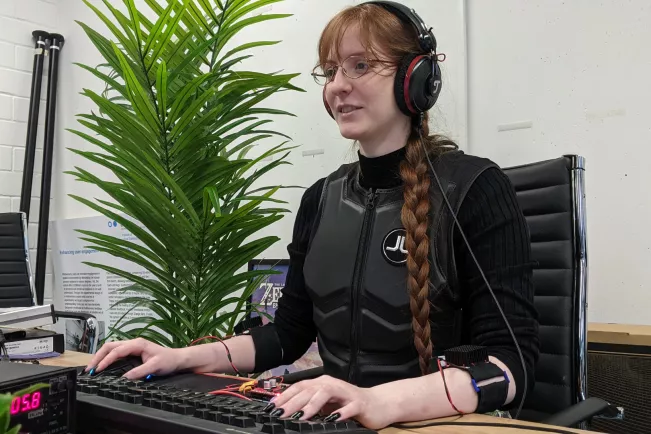Department of Computer Science
Ouch! - Pain simulation in games

After completing her Bachelor's degree in Computer Science, Janelle Pfeifer has now also successfully completed her Master's degree in Visual Computing & Games Technology.
In her Master's thesis on the topic of "Pain Simulation", Pfeifer asks herself whether a combination of visual, auditory and haptic feedback can simulate the pain of a virtual avatar in a computer game without inflicting real pain on the player. The idea is to deliberately deceive human perception. An emphatic bond between player and avatar, as well as the visual context of the computer game, lead to harmless haptic feedback being interpreted as pain. The goal of simulated pain is to enhance the gaming experience.
Using the cooperative first-person shooter game "Payday 2" as a basis, a pain simulation was implemented. The visual and auditory feedback of the game were adapted, while haptic feedback is provided by a haptic waistcoat with 40 integrated vibration motors. In addition, there are two Peltier devices that provide cold feedback and are worn on the arms.
A study was conducted to see how effective the individual feedback elements are at simulating pain and how they change the gaming experience. It turns out that the combination of the haptic waistcoat and cold feedback - using harmless stimuli - can successfully simulate pain. Participants in the study stated that the game was more fun and immersive. Players felt they played more cautiously, but are still willing to take risks to achieve the game's goals. An analysis of the game statistics shows that players neither play better nor worse when pain is simulated.
The supervisors of the Master's thesis, Prof. Dr. Jan Gugenheimer from the TU Darmstadt and Prof. Dr. Ernst Kruijff from the Hochschule Bonn-Rhein-Sieg, University of Applied Sciences, congratulate on the success and are pleased with the exciting topic of the thesis, which provides the basis for further research studies.
Kontakt

Ernst Kruijff
Professor for Human Computer Interaction, Co-Director Institute of Visual Computing (IVC)
Location
Sankt Augustin
Room
C 273
Address
Grantham-Allee 20
53757, Sankt Augustin
Telephone
+49 2241 865 9616